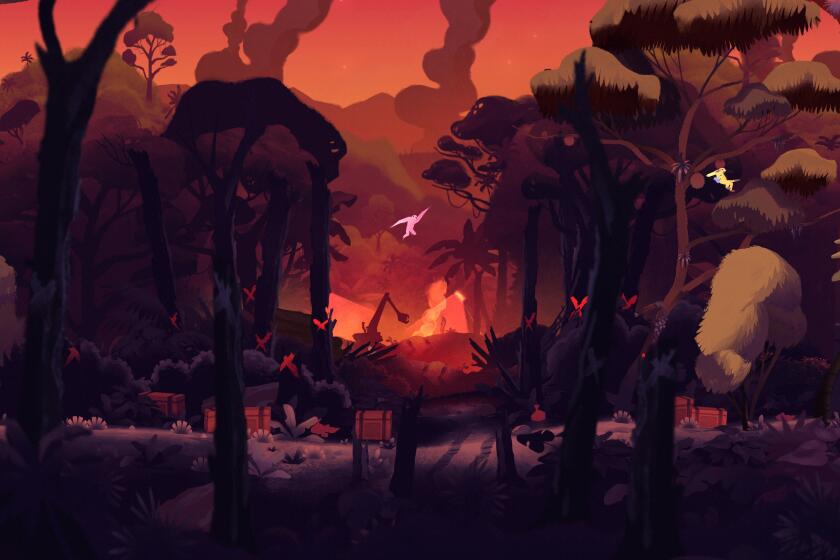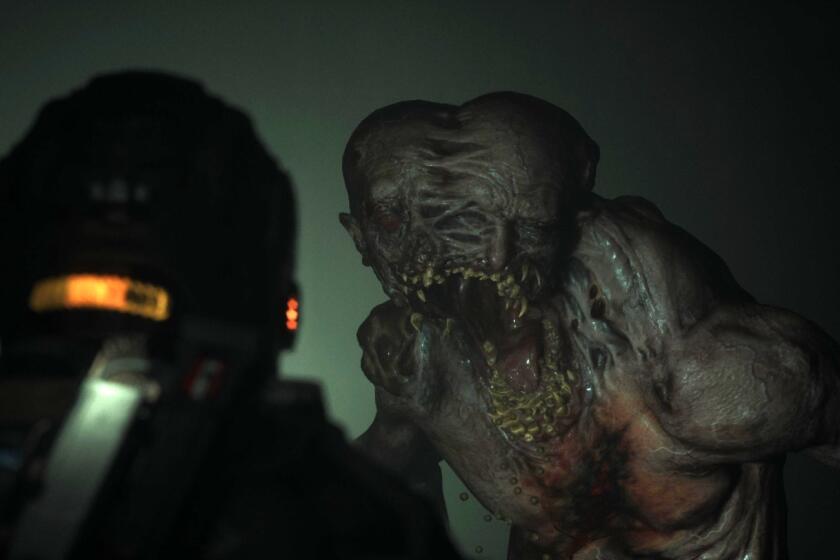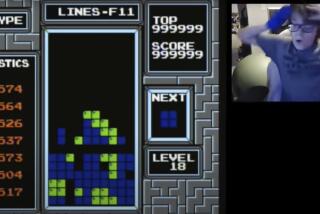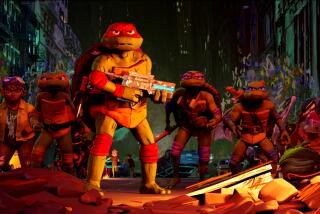‘Teenage Mutant Ninja Turtles: Shredder’s Revenge’ is way more than retro-cool
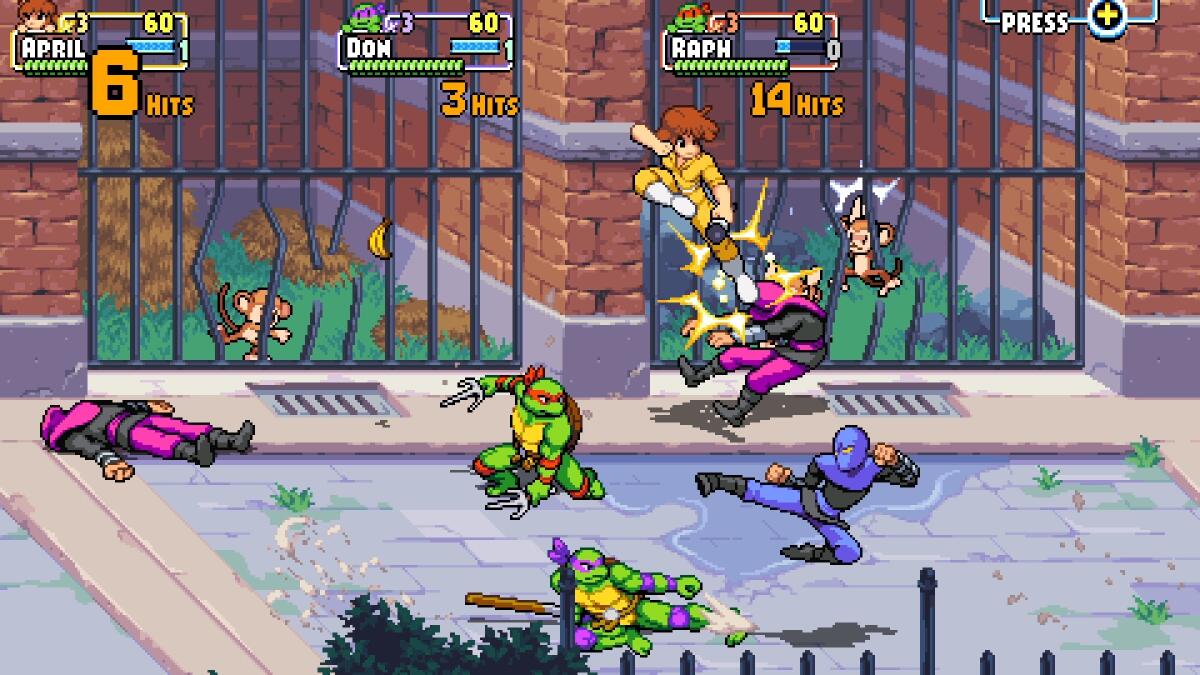
- Share via
For the nostalgic Teenage Mutant Ninja Turtles fan, the new game “Shredder’s Revenge” will be something of a dream. The work, after all, pays homage to the original 1987 cartoon series, as well as the iconic 1991 Super Nintendo game “Turtles in Time.” It’s the turtles at their most bodacious — lighthearted, chaotic and approachably humorous. And all of it is delivered with a loudly bright pixel art style.
But it’s not the late-’80s/early-’90s sentimentality that makes the game work as well as it does.
It’s the modern flourishes, whether that’s newsperson April O’Neil wielding broadcast equipment as a weapon or a bounty of cutesy animations that the henchmen engage in before the brawling starts. Within minutes of booting up “Teenage Mutant Ninja Turtles: Shredder’s Revenge” I smiled, enjoying the way the evil Foot Clan had besieged the news station, and immediately got to work behind the reception desk and in the recipe kitchen, rather than trashing the place.
Nostalgia is an important ingredient in “Shredder’s Revenge,” but revival-inspired video games work best when they’re retro without feeling retro. That’s been the specialty of Montreal-based Tribute Games and Paris-based Dotemu, which combined talents to make an older version of the Teenage Mutant Ninja Turtles feel fresh again. Rather than try to reboot the series, like more recent film and television offerings, the studios instead took influences not only from decades-old Nintendo games but also long-discontinued ’80s and ’90s toys, wanting the game to have the charming, family-friendly appeal of spending time in a digital play set.
There are underlying motives to the game, of course. No doubt, for instance, modern keeper of the brand Nickelodeon wants the intellectual property to stay front of mind before a new animated film debuts on Netflix later this summer. But to Tribute and Dotemu, “Shredder’s Revenge” is another instance in which they can keep alive — and reintroduce — aging pixel art styles. While pixel art gets used heavily in independent games, and local studio Yacht Club Games has found fame in crafting love letters to the 8- and 16-bit eras of yore, with “Shredder’s Revenge,” Tribute and Dotemu set out to revisit, revamp and improve upon the games of their youth.
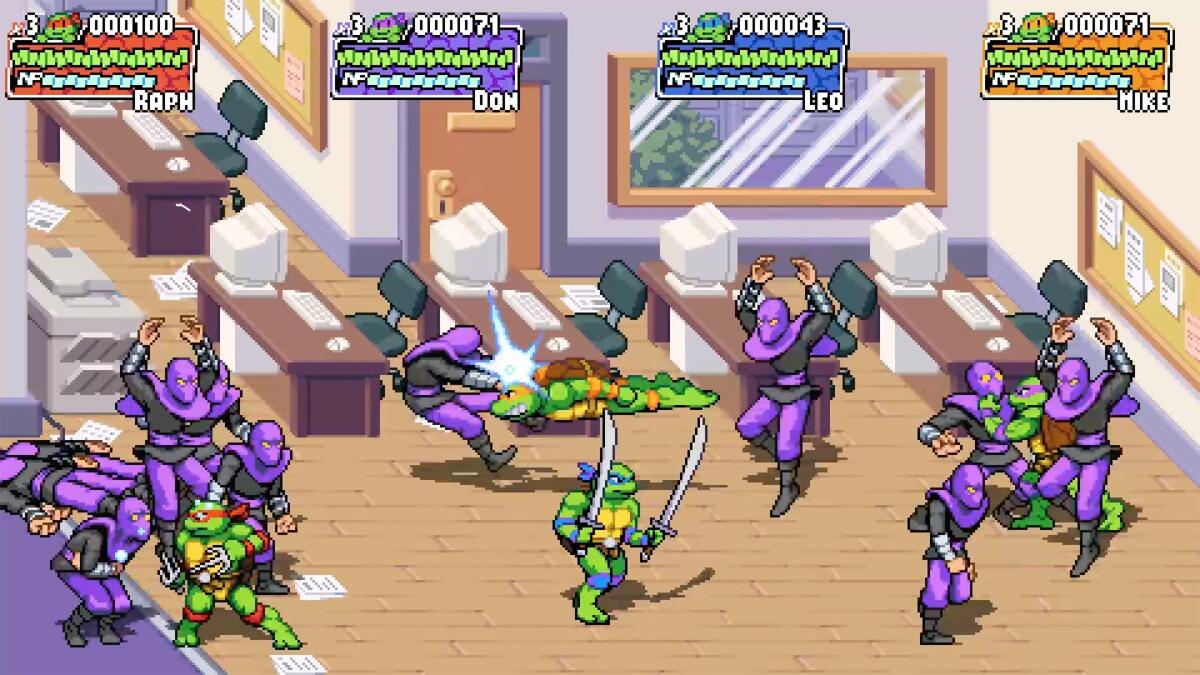
“People are going to compare it to the arcade games of the ’80s and ’90s,” says Tribute Games co-founder Jean-François Major. “People have flawed memories of that era. If you were to play any of the older Nintendo or Super Nintendo games, they’re pretty hard. The controls aren’t as intuitive. There’s a lot of quality-of-life things that we’ve gotten used to doing today with modern games. We needed to make it look like a game from the ’90s but modernize it.”
Says Dotemu CEO Cyrille Imbert: “What I find really interesting in video games is gameplay is a language that you learn through time and evolves through time. We don’t speak the same language as we used to speak when we were younger with video games. As a creator, even if you work on a game that looks like a retro game, you’ll need to make your current language work within the game.”
There were plenty of other challenges. Modern games tend to place a greater emphasis on story than in decades past, and the studios aimed to balance narrative animations with the mayhem of playing with up to six players. Encouraging players to replay the game was a core goal, as “Shredder’s Revenge” should be able to be completed in less than three hours. That meant making sure that each character had a unique feel and that the narrative elements didn’t get in the way. And then there were the decisions to be made over what to keep — and what to update — from earlier Ninja Turtles works.
Broken Rules wanted to make a game about gibbons after seeing the animals in action at the local zoo. Then they learned about poaching.
That’s where lessons from the team’s past game projects came into play. Dotemu is perhaps best known now for “Streets of Rage 4,” a resurrection of the beloved Sega Genesis-era brawler, and Tribute Games was founded by a team of former Ubisoft employees who worked on “Scott Pilgrim vs. the World: The Game” before forming their own company and crafting original titles such as the “Metal Slug”-influenced “Mercenary Kings.” It’s worth noting that, when back at Ubisoft, some Tribute team members worked on the Game Boy Advance title “TMNT,” based on the 2007 film of the same name.
“The Turtle games were less about one-to-one combat,” Major says. “It was more about crowd control. When we replayed the older games, we counted how many enemies entered the screen, and we tried to match the pacing and the rhythm.” That differs significantly from “Streets of Rage 4,” which is more one-on-one combat, and “Scott Pilgrim,” whose pacing is more in the middle, he said, explaining that “Scott Pilgrim” is “faster-paced than ‘Streets of Rage,’ but it’s still slower than a ‘TMNT’ game.”
In “Shredder’s Revenge,” enemies seem to come from every direction, whether one is walking through a Channel 6 newsroom or skateboarding through Manhattan. They’ll be idly going about their business when a character enters the screen, until more foes come from windows, doors or behind, and one can suddenly be fending off a pileup. With three difficulty levels, though, “Shredder’s Revenge” should work for casual or family play sessions, as well as more hardcore runs for those who want to master the game’s dozens of moves. But be careful. If you’re anything like me, you’ll lose a bout while being distracted looking at the parrots, hippos and giraffes in the background of the Central Park Zoo level.
‘You can always come up with new ways to scare people’: The ‘visceral’ horror of ‘Callisto Protocol’
Veteran video game designer Glen Schofield loves to scare players. “The Callisto Protocol” hopes to do just that.
“We went back to the ’87 design of the Turtles,” says Major. “If you remember the TV shows back then, they were somewhat funny. They weren’t super violent. They had more of a humoristic tone with them. We tried to work with that and keep that in mind. While you’re fighting, we’re trying to be lighthearted.”
Inspiration sometimes came from unexpected places. “We also took a lot of influence from the toy lines of the era,” Major says, specifically citing some robotic toy vehicle designs that made it into the game. “They had some pretty funky toys. That adds to that vibe. We didn’t really mind if they made it into the show or not. If they made sense, we opted for it.”
Another modern invention: Each Turtle here moves at its own pace and comes with its own set of fighting abilities. In the older arcade games, says Major, “The Turtles all shared their own move set.” But even here the team referenced vintage designs, going back and looking at a six-player “X-Men” coin-operated, dual-screen arcade game from the early ’90s. One objective, says Major, was to essentially ensure that the game felt different no matter how many people were playing.
“I don’t even know what magic was needed for it to not have a big gap in the middle,” says Major of the “X-Men” game. “That was something that really steered our decision making. Could we do a six-player beat-’em-up? It’s more fast-paced, really chaotic. The experience is a lot different when you’re playing with six players. It becomes more of a party game than a tactical crowd-control game. We designed each level to have different waves of enemies — different patterns — depending on how many players are playing. There was care that was put into that and taking into account how many players are playing the level. That was a lot of work and a challenge for us, but I think it’s something people will appreciate.”
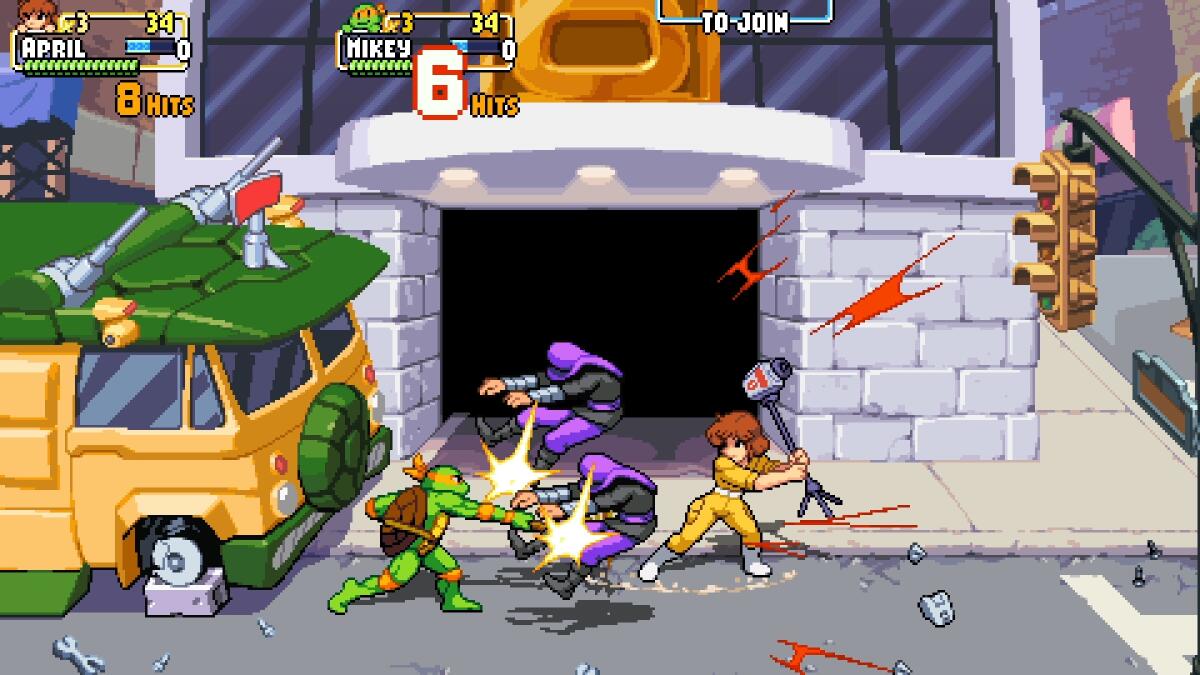
Initially, says Major, Nickelodeon approached Tribute Games to work on a different property, but Tribute was built for original games, and Major says the studio pushed for “Teenage Mutant Ninja Turtles” if it was going to venture into licensed properties. That was partly because many members of the team had experience with the brand from their Ubisoft days and partly because those early Turtles games stand as major influences in the side-scrolling, beat-’em-up genre.
“The Turtle games left a mark on the whole industry,” Major says. “Back then, if you had a Super Nintendo, it was the game to own. If you had a Super Nintendo, you had to have ‘Turtles in Time.’ And we wanted to go back to the era when people were huge TMNT fans.”
It also helps that the property is just a tad weird, says Major, who admits he dressed up as the bo-staff-wielding brains of the operation, Donatello, as a kid for Halloween.
“When you think about Mario, for example,” says Major of the Nintendo mascot, “the guy is a plumber. I don’t think if you introduced a plumber today, it would really work. But that game is iconic. The Turtles were a revelation when they were released. It holds up, and I don’t even know why. There’s something appealing with all the characters, and they’re all so different from one another.”
“Everyone can identify with one of them,” interjects Imbert. “Everyone has their own favorite Turtle. They’re not perfect, and that’s what makes them cool. They’re just teenagers, but also turtles.”
Expect, however, with “Shredder’s Revenge,” everyone’s favorite characters to perhaps not be Turtles at all. From the start, says Major and Imbert, it was crucial that reporter April O’Neil was a playable character. “It was always planned to do that,” Major says. “April, from the first pitch that we did, was playable. I just feel it’s time. We wanted to have a broader roster, and not just the Turtles. It was really time for April to have her moment to shine and not be just a damsel in distress. She’s been with the Turtles all this time, and it’s time for her to kick butt.”
Consider it a decision — and a game — worthy of one of April’s signature moves: the mic drop.
'Teenage Mutant Ninja Turtles: Shredder's Revenge'
More to Read
The biggest entertainment stories
Get our big stories about Hollywood, film, television, music, arts, culture and more right in your inbox as soon as they publish.
You may occasionally receive promotional content from the Los Angeles Times.
